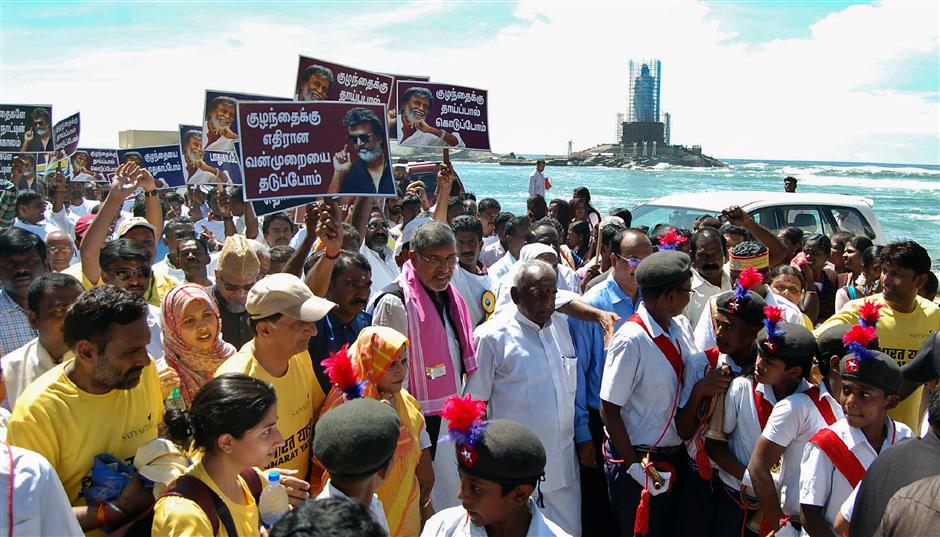Indians kick off march set to be world's biggest of its kind

Indian Nobel Peace Laureate Kailash Satyarthi (C) walks during the 'Bharat Yatra,' a nationwide march against child sexual abuse and trafficking, in Kanyakumari on September 11, 2017.
Thousands of people gathered in southern India yesterday to kick off what is expected to be the world’s largest march against the trafficking and sexual abuse of children as reports of such crimes continue to rise in the country.
Organized by Nobel Laureate and child rights activist Kailash Satyarthi, over 10 million people from across India are to take part in the month-long “Bharat Yatra” — or India March — which will end in New Delhi on October 16.
Flagging off the march from Kanyakumari, a coastal city on the southern-most tip of India in the state of Tamil Nadu, Satyarthi told crowds of school children, officials and activists it was time to shatter the silence around such crimes.
“The sun rises every morning. But today this morning is different and this sun is different. Today this sun rises to dispel the darkness of fear, hopelessness and shame faced by our children. Today we march to end this,” Satyarthi said.
“India is known for a country where children are being raped, where children are being sold. They are not safe in their schools, they are not safe even in their homes. If one child is in danger, then it means that the whole of India is danger.”
Children in India face a barrage of threats ranging from human trafficking, sexual violence and early marriage to a lack of access to quality education and health care, say activists.
More than 9,000 children were reported to have been trafficked in 2016, a 27 percent rise from the previous year, according to government data.
Most are from poor rural families who are lured to cities by traffickers who promise good jobs, but then sell them into slavery as domestic workers, to work in small manufacturing units or farming, or pushed into sexual slavery in brothels.
In many cases, they are not paid or are held in debt bondage. Some are found, but many remain missing.
Figures from the National Crime Records Bureau also show that almost 15,000 children were victims of sexual violence such as rape, molestation and exploitation for pornography in 2015, up 67 percent from the previous year.
But these figures are just the tip of the iceberg in socially conservative India, say activists, where fear of being blamed, shamed or stigmatized means victims and their families often keep quiet and do not report the abuses they face.
Satyarthi, whose charity Bachpan Bachao Andolan (Save the Childhood Movement) has rescued 80,000 enslaved children, said the march was part of a three-year campaign to spread public awareness and push for stronger policies on child protection.
The march participants will travel around 11,000km and cover 22 of India’s 29 states. They will stop in towns and villages as well as visit schools and colleges and hold events with local officials, police, religious and community leaders.















